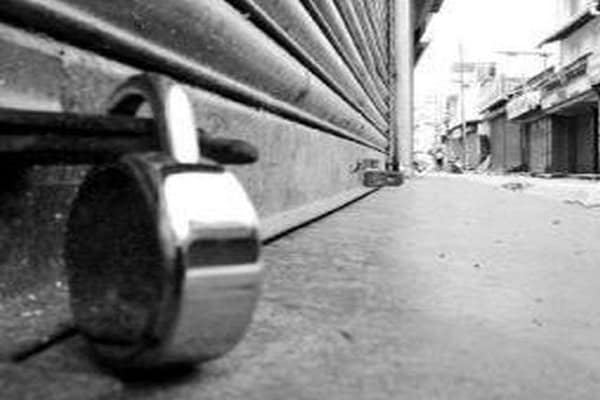Bengaluru: The Karnataka shutdown on Thursday, which disrupted normal life in cities and towns across the state, ended peacefully barring stray incidents of stone-throwing, burning of tyres to block roads and forcing shops to close, said police.
“The day-long shutdown ended peacefully by evening (6 p.m) though there were attempts to stop train services at Bengaluru and other railway stations in the state,” a top police official told IANS here.
About 100 activists of the Kannada Rakshana Vedike, including its president Narayana Gowda were detained when they attempted to barge into the city railway station to stop train services.
Similar attempts were made at Hubballi, Yadgir and Kalaburgi in the state’s northern districts.
“Tight security and presence of our personnel across the city ensured peaceful shutdown and prevented anti-social elements and miscreants from causing trouble or mischief,” asserted Bengaluru Police Commissioner T. Suneel Kumar.
With buses, trucks, taxis and autos staying away from dawn to dusk, roads in cities were deserted and highways across the state had less vehicular traffic during the day.
“Those who were forcing small shopkeepers and eateries were whisked away and detained during the shutdown and let off later,” added Kumar.
The 12-hour shutdown was observed for getting the Mahadayi river water from neighbouring Goa to meet the drinking needs of the people in Belagavi, Bagalkote, Dharwad and Hubballi districts.
Farmers and pro-Kannada organisations and regional outfits announced the dawn-to-dusk protest seeking Prime Minister Narendra Modi’s intervention to resolve the two-decade-old inter-state water sharing dispute.
The Mahadayi river’s water was needed for drinking and irrigation in the four drought-prone districts of Karnataka, activists said.
Schools, colleges, offices, hotels, malls, markets and theatres remained closed in most of the cities and towns across the city.
The shutdown also logged out India’s tech hub with global software majors Infosys, Wipro and multinationals suspending their operations for the day and make up for the loss by asking its techies to work on Saturday.
Although the shutdown did not affect train and flight operations in Bengaluru, hundreds of passengers were stranded at railway stations and the airport in the absence of state-owned and private buses and taxis.
The few three-wheelers plying in Bengaluru fleeced passengers.
Heavy rush of commuters was witnessed at all the stations of Bengaluru Metro which operated the service on the east-west and north-south corridors.
Though government offices and banks remained open, attendance was thin as employees were unable to commute from their homes in the absence of public and private transport.
Essential services like hospitals, supply of milk, sale of vegetables and fruits and medical shops were available to avoid inconvenience to the public.
The 77-km Mahadayi or Mandovi river originates at Bhimgad in the Western Ghats in Belagavi district and flows into neighbouring Goa, eventually joining the Arabian Sea.
Though the river runs 29 km in Karnataka and 52 km in Goa, its catchment area is spread over 2,032 km in the southern state as against 1,580 km in Goa.
Karnataka has been asking Goa since 2001 to release 7.6 thousand million cubic feet of the river water to meet the drinking needs of its people in the drought-prone districts and irrigating the farmlands.
Karnataka plans to build two canals at Kalasa and Banduri, which are the tributaries of the river in the state, to divert and supply the water to the four districts.
The Mahadayi Water Disputes Tribunal, headed by J.N. Panchal, on July 28, 2016 rejected Karnataka’s petition for releasing the water, citing various grounds including ecological damage the twin canal projects might cause.
IANS

